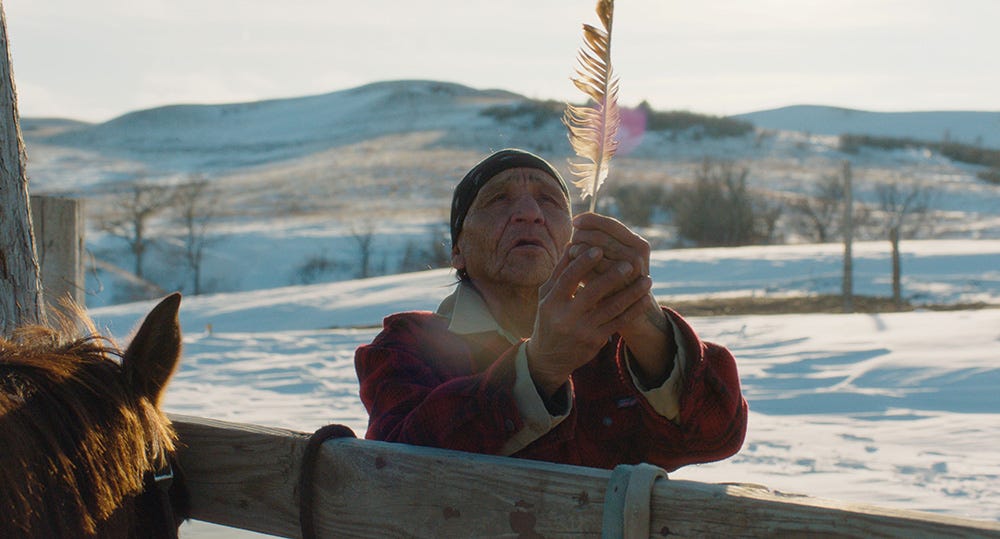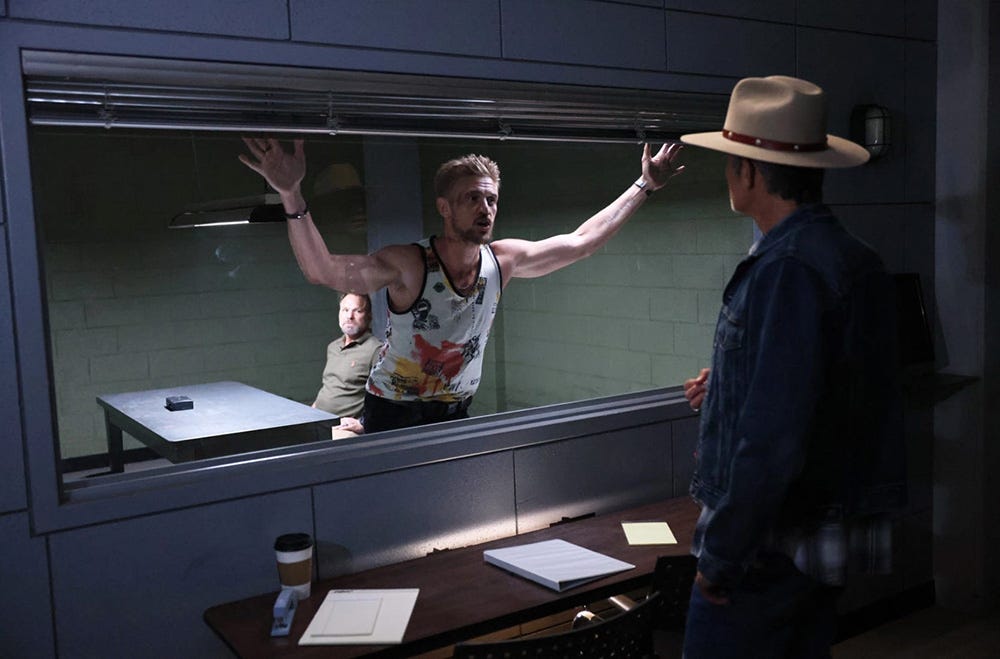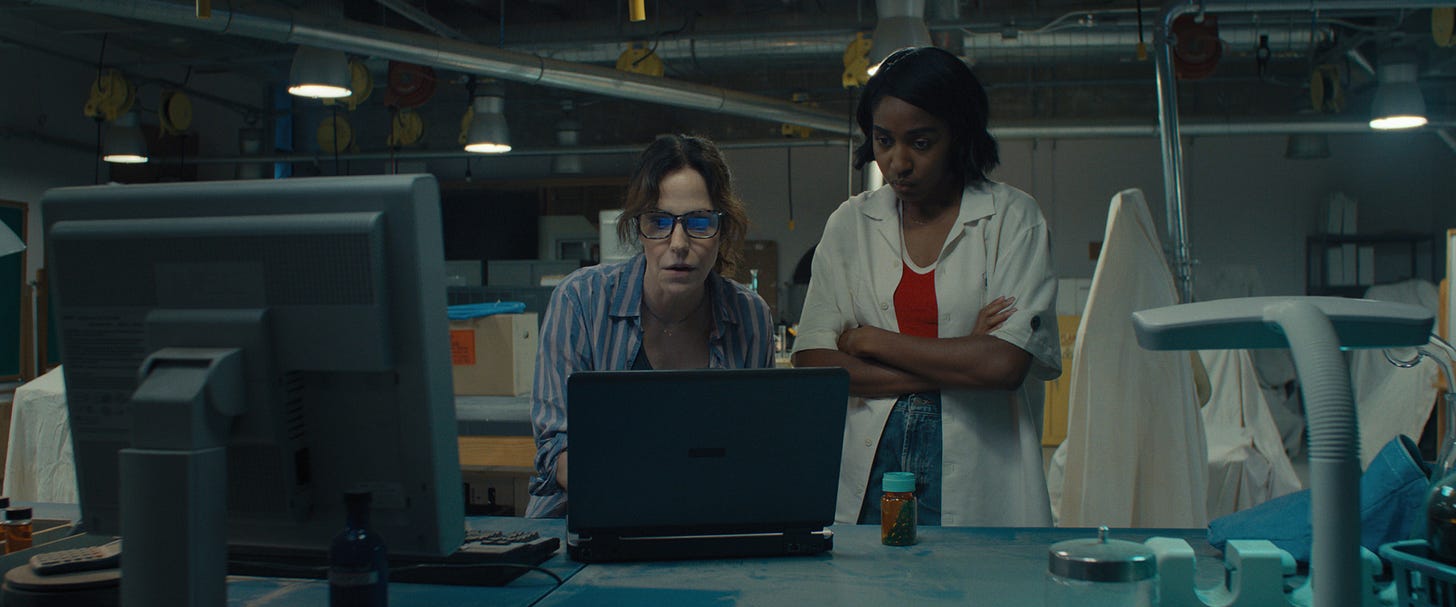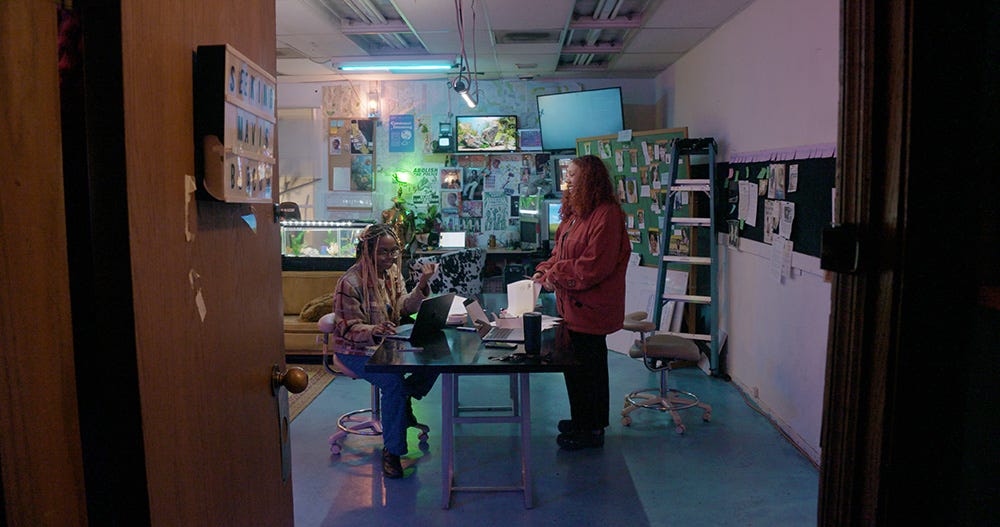Week Ending 9/20/24
The Hargreeveses
After watching the two miniseries reviewed below (and the first part of COBRA KAI Season 6), I decided to binge another finished show. And since it just had its finale recently, I thought THE UMBRELLA ACADEMY was a good choice. I’m enjoying it a lot so far.
It’s very DOOM PATROL. With a little of LOKI’s TVA mixed in too. So, definitely derivative of so many other comic fare (sorry, Gerard Way), but also a ton of fun. The characters are over-the-top clichés in the best way. The acting is great. The music selection is even better. And who doesn’t like a show that can reset its own timeline to start again rather than constantly think of new, bigger drama to pile onto the drama that was just solved?
Season 1 is solid. The “twists” are obvious, but also not trying to be secretive. I hate when a show gives you hints about things and then doesn’t pay them off until a few episodes later. Here, you can pretty much assume that any big clue-ignited epiphany on your part will be corroborated or refuted before the end of the episode. It doesn’t pretend to be smarter than it is.
Season 2 seems to be going very heavy on the cinematic visual references (or maybe I was just too invested in the plot of Season 1 to notice it did too). Kind of distracting, but it’s still fun to follow these idiots as they try and save the world.
What I Watched:
EUREKA
(limited theaters)
There’s little that’s literal about Lisandro Alonso’s EUREKA. He himself says it’s his most complex film in that it would be as difficult to put into words as a painting. There are definite through lines, however. Indigenous Americans. Birds. Desperation. It’s a journey outside of time and space that metaphysically shifts perspectives from fictionalization to reality and human to animal. One chapter leads to the next as dreams are shattered, families broken apart, and survival proven to be an arduous undertaking not for the faint of heart.
Alonso and his co-writers Martín Caamaño and Fabian Casas start things in black and white full frame. It’s a western starring Viggo Mortensen as Murphy, a father searching for his disappeared daughter in a wild, lawless town of prostitutes and murderers he has no problem killing to achieve his goal. Then they move to widescreen color in South Dakota’s Pine Ridge Reservation to follow a police officer (Alaina Clifford) and a youth basketball coach (Sadie LaPointe) hanging on by a thread to existences marked by unavoidable fatigue. And finally things shift to Brazil and a native (Adanilo) forced into exile along a prospecting riverbank who finds his dreams constantly shattered by the greed and jealousies of other men.
The first two chapters are connected by Chiara Mastroianni—a character in Murphy’s world and an actor researching a role in Alaina’s. The second two are bonded by a jabiru mycteria—a bird one character becomes before traveling south to claim another. Don’t therefore count on an actual passageway as much as a thematic one. Think more about parents and children. Prejudiced laws and the criminalization of sorrow. Dreams of escape and the prisons of reality. It’s a rather depressing set of circumstances wherein hope ultimately comes from death. Relief from the hardships of our world through the peaceful promise of eternity.
It’s a contemplative piece that moves at a glacial pace to live in its anguished weariness. Many moments unfold in silence whether shooting basketballs, panning for gold, or waiting for someone’s arrival. The imagery is beautiful shot and the performances are achingly real if sometimes obviously untrained. And the message is clear as far as how insufficient the resources for native people in the Americas are. Don’t expect any answers, though. Heck, don’t expect many questions either. Alonso and company are simply holding up a mirror onto the burden carried upon the exasperated shoulders of the displaced and marginalized.
- 6/10
JUSTIFIED: CITY PRIMEVAL
(streaming on Hulu)
After having just rewatched the entirety of JUSTIFIED’s six seasons to prepare, I can say with certainty that CITY PRIMEVAL is the weakest chapter of the bunch. It’s not bad. I had a good time with it. It’s just tough to really dig in when Raylan Givens (Timothy Olyphant) himself doesn’t belong. That was always the fun part of the show. Despite Givens being a US Marshall and the world of Harlan County being a cesspool of criminal activity, he still belonged. He knew those people. He understood those people. Here, in Detroit? He’s just another cop.
That’s why I hope the epilogue tease bears fruit because I’d love to see the character get one more adventure in Kentucky. Put him back in his element rather than surrounding him by corrupt residents in a corrupt city he’s simply not invested in. I always thought it was funny the way Graham Yost and company treated Detroit like it was an even more comical version of Gotham City than Gotham City, but Michael Dinner pretty much does the same here. Sure, it has some dramatic bite and cursory glimpses at history via music, but Clement Mansell (Boyd Holbrook) is as “Batman villain” as they come.
Again, though. He’s entertaining. You kind of want to see what will happen once he and Raylan go toe-to-toe, but it’s hard to really sell it since the latter seems to have one hand tied behind his back. First, it’s because his daughter is there (Vivian Olyphant’s Willa). Then it’s because he’s trying to protect potential romantic interest Carolyn Wilder (Aunjanue Ellis-Taylor)—who’s caught in the middle as Mansell’s coerced lawyer in order to protect Sweetie (Vondie Curtis-Hall), his accomplice and her father figure. Add the most comical piece of the whole via a caricatured crew of Albanians waiting in the wings for violence and the show finds itself losing the plot to create ancillary melodrama that doesn’t quite earn merit.
There are a couple twists and turns to keep things interesting, but they don’t generally matter in the grand scheme beyond stretching out the episode order to eight. I liked what goes on with the cops (Marin Ireland, Victor Williams, and Norbert Leo Butz) because they are presented with enough gray to never truly know if they’re on the up-and-up. The race stuff seems super forced and almost as comical as the Albanians, but I guess I get it? Having Carolyn’s ex pretty much call Raylan a “honky” for five minutes straight is a weird choice, though. Maybe Dinner was trying to make up for the fact that the Detroit presence in the original show was all white (the Tonins).
So, while it’s an okay police procedural with a fantastic antagonist (Holbrook truly is the highlight here), it’s just a mediocre season of JUSTIFIED. Cool to get another chapter of the Givens’ saga courtesy of another Elmore Leonard novel, but I’m realizing that the thing that made the original run so captivating was its setting of Harlan rather than Raylan himself. Go figure.
- 6/10
A MURDER AT THE END OF THE WORLD
(streaming on Hulu)
This was very, very good. No one should be surprised, though, considering it was created by Brit Marling and Zal Batmanglij. I say that as someone who hasn’t even watched THE EAST or THE OA yet. That’s how good SOUND OF MY VOICE is and how good Marling’s collaborations with Mike Cahill (ANOTHER EARTH and I ORIGINS) are too. Not only does this trio of good friends create compelling science fiction, but they also have a knack for mining down into the human condition through that lens. Because like the “big mistake” says, it’s not about understanding the killer. You must first understand the victim.
The victim of A MURDER AT THE END OF THE WORLD? His name is Bill Farrah (Harris Dickinson). Why would someone want him dead? That’s the thing. They shouldn’t. The mystery is therefore discovering what it is he might know—wittingly or unwittingly—that could put him in someone’s crosshairs. Does it have to do with the impending destruction of the world? That’s why tech billionaire Andy Ronson (Clive Owen) has invited free thinkers to this Icelandic retreat. Maybe it’s because Bill’s artwork puts the businesses Andy and guests Lu Mei (Joan Chen) and David Alvarez (Raúl Esparza) run on blast? Might it be personal?
That’s where Darby Hart (Emma Corrin) comes in. A hacker, amateur sleuth, and published writer, the twenty-four-year-old has no idea why she made it onto Andy’s guest list, but she accepts because he’s married to her hacker hero: the elusive Lee Andersen (Brit Marling). She also has a history with Bill as the two of them went on a road trip to catch a serial killer six years prior. Could the connections all be some crazy coincidence? Sure. Anything is possible. The ironic thing, however, is that them all coming together in one secluded location can lead to unintentional results even if the collection itself was intentional. Impulse and emotions tend to steer even the most meticulously planned events towards utter chaos.
So, Darby is pretty much on her own once Bill falls since she’s the only one who suspects foul play. This is a friendly consortium after all. If the evidence looks like an overdose, why would anyone question it? The simplest solution is generally the correct one and grief has a way of playing with our minds. Couple that with an inherent bias against young women (more than one person calls her a “child”) and it’s no surprise everyone patronizingly tells Darby to rest and/or go home. They don’t want to think about conspiracy theories. They don’t want to think something is wrong to the point where their own lives are in danger. Will they still turn that blind eye once another body drops?
The story is told through Darby’s perspective. I could be wrong, but I believe the show stays with her conscious vision for the duration of its seven episodes. As such, we become privy to her memories and thoughts to constantly be taken back to that road trip with Bill as a means of inferring upon the present. We glean details of their journey together as well as their independent motivations. The result is that we would be making a mistake to not question where Darby’s head is at. This is personal for her, and it might be clouding her judgment. Not from the fact that Bill could have accidentally OD’d, but the possibility that this is personal for other people in the room too.
It’s a fun group. Esparza’s Alvarez and Ryan J. Haddad’s Oliver Marwan are mostly pushed to the background as tech/business geniuses until they’re needed. So too are Pegah Ferydoni’s Ziba and Jermaine Fowler’s Martin Mitchell as artistic minds meant to even out the brain power. That doesn’t mean they aren’t integral to the case., though, since there are only so many potential witnesses/victims/murderers to choose from. It’s just that suspicion is easier hung around Lee, Andy, Lu Mei, and Javed Khan’s Rohan Ravjit’s necks. Or perhaps their emissaries like Andy’s bodyguards Todd (Louis Cancelmi) and Eva (Britian Seibert). For Darby’s case, the only true ally is astronaut Sian Cruise (Alice Braga)
And so we watch and learn as Darby does. We have our suspicions about culprits and wonder who might be next since the next victim is often our current villain of choice. That’s the beauty of what Marling and Batmanglij have created. They know exactly what they’re doing with these characters in such a way that it feels like they were working from a closed loop with as many connections forwards as backwards so as not to tip their hand. Add Lee and Andy’s son Zoomer (Kellan Tetlow) running around and the location’s AI assistant Ray (Edoardo Ballerini) responding to requests in the most literal sense of each word spoken and there’s even a bit of humor to keep our minds fresh.
Don’t just think this is simple espionage, though. That would be such a waste of everyone’s efforts. Maybe that plays a role, but it can’t be all. Not when there is so much connective tissue that isn’t born from a boardroom. Not when the supposed real target is just as likely to be the real perpetrator. And when technology becomes a means towards homicide, the mystery grows even deeper since most of the guests have the technical prowess to hack a system (it’s why Andy confiscated cellphones in the first place). You can’t even let yourself assume Darby isn’t also a suspect. Who’s to say that single point of focus is reliable when she’s always binge drinking or snorting Ritalin?
It’s why a tech thriller murder mystery is such a brilliant genre-bending concept. It makes us question the character’s reliance on computers and security while also understanding the emotional impulses that make humans embrace or reject that reliance. Survival becomes a mix of using the tech and avoiding it too. You can’t live through the cold without a good suit, but you also can’t trust that suit won’t kill you for the trouble if someone messes with its code. It’s therefore all on Darby to discover the breadcrumbs like she and Bill did before. It’s simply much harder to do so when your hive mind consists of strangers who don’t respect you rather than game peers on a Subreddit.
The script is solid. The production design is impeccable. And the casting is fantastic. Corrin and Dickinson drive it with their complex relationship that hits home via flashbacks. Owen and Marling wade in that gray area of uncertainty until the last possible second. And the rest of the periphery players never waver in keeping things close to the vest for reasons other than what we assume. Because there are so many different threads going on here. Many different motivations that go well beyond the obvious answers even if the biggest answer of them all proves as obvious as it can get. That we receive commentary on global warming, AI, gender and economic disparity, and mental health while also being thoroughly entertained is icing on the cake.
- 9/10
OMNI LOOP
(limited theaters & VOD)
It will always be easier to regret what we don’t have than cherish what we do because that which we possess is safely assured regardless of the risks taken to achieve it. So, we inevitably crave the allure of more. Of different. Of the idea of “better” without knowing if it actually would be better at all. We choose to look back rather than push forward precisely because the moment is gone. We romanticize it and maintain its illusion since consequences don’t matter to a hypothetical. And we devalue where we ended up by losing ourselves in the belief that our current life is that consequence.
This is the headspace in which we meet Zoya Lowe (Mary-Louise Parker) at the start of Bernardo Britto’s OMNI LOOP. It’s the headspace we’ll soon discover she’s been mired in since she was twelve years old. Because that’s when she first took one of the inexplicable pills that have allowed her countless five-day do-overs. Take one and you wake up in the past to make a different decision, give yourself more time, or retake that test you failed. And they never deplete either since you’ll be regaining consciousness before you ever took it. We’re talking time travel in a bottle that erases instant regret. Enough of a miracle to make you want more.
Five days might solve a simple mistake, but it can’t fix anything outside that window. Just because Zoya didn’t regret starting a family with husband Donald (Carlos Jacott) and daughter Jayne (Hannah Pearl Utt) at the time doesn’t mean she won’t decades down the line upon realizing her research remained incomplete. Research that might have cracked the code of those pills to wield time travel outside of their built-in constraint. If she kept with it, maybe she wouldn’t be dying of a black hole (the film’s sci-fi is very goofy). At least not right now. Not after prolonging her demise five days at a time for so long that she’s begun to resent the seemingly rote motions of love.
So, Zoya decides to pivot by spending these infinite five-day stretches to solve the problem she couldn’t thirty years prior when she chose motherhood instead. (Britto wielding Zoya’s life as a binary career vs. family battle without middle ground is admittedly unfortunate, but it does purposefully augment the inherent themes at play.) She recruits Paula (Ayo Edebiri) after a chance meeting, figuring out a shorthand to get her on-board as quickly as possible each restart to keep moving their experiments forward. The two get so wrapped up in the work that everything else is neglected—including Paula’s own autonomy in the project. Zoya becomes so obsessed with her own desire that she never considers her partner’s.
Hence the binary. Could Zoya have lived a life where she loved Donald and Jayne while also continuing her research? Of course. Would it have allowed her to be so passionate about one over the other that this burning desire to change everything ignited? No. Zoya needs to have given one up for the other to crave the “what if” of a do-over. And she needs to give up the other in pursuit of that one to finally see why she made the original choice in the first place. It all goes back to our age-old yearning for immortality always forgetting death’s importance to life’s equation. If Zoya does find a solution to time travel, won’t she just end up regretting the need to erase the life and love she already had?
It’s the crux of OMNI LOOP and effectively delivered through the mirrors Britto creates with Paula and Zoya’s ex-classmate and contemporary Mark (Eddie Cahill). He uses them for that purpose so he can keep Zoya invested in her compulsion. He can gradually and imperceptibly move her and the film away from the family and into the research with humor and excitement so that we forget the dynamic completely until the bottom drops. Just like the lie Zoya is telling herself, we believe this quest is for her family. But it’s not. It’s about pride. Hubris. It’s about labeling everything she has done as meaningless and everything she could still do as worthy.
Only when the choice arises again to slap Zoya awake does clarity arrive for her to recognize that despite the price paid being imaginary then, it is very real now. Paula therefore becomes an example of who she was. Mark becomes a vision of who she might be if it works. And Zoya opens her eyes back up to remember who she is. It’s a much deeper role than you might initially assume, and Parker excels at delivering that complexity at the perfect moments. Edebiri, Harris Yulin, and the rest of the cast provide wonderful support, but this is Parker’s film. From the boredom to the intensity to the sorrow and joy, it’s all worth getting to one final revelation that even Zoya forgets is still lingering upon the horizon.
- 8/10
SEEKING MAVIS BEACON
(limited theaters)
I do like a documentary that doesn’t quite deliver on its promise. When the filmmakers set out to provide answers to a question only to discover more questions and different answers along the way. There’s an energy to these projects that simply cannot exist in one with a very clear motive, direction, and execution. The filmmakers themselves become subjects in relation to their quest rather than the quest steering purpose in relation to them. What does the journey that is SEEKING MAVIS BEACON give Jazmin Jones and Olivia McKayla Ross?
Because it’s so much more than a love letter to an icon—either the game (Mavis Beacon Teaches Typing) itself or the woman whose likeness was used to represent the titular character (Renée L'Espérance). It’s about identity. Race. Appropriation. Technology. Artificial Intelligence. Legacy. Privacy. These two women have the best intentions of letting Renée speak on the record and clear the air considering everything we know about her involvement comes from the varying tales of the white people who “found” her, paid her, and ultimately betrayed her. But maybe there’s a reason that’s true. Maybe Renée would rather stay erased.
It’s that revelation that really drives the film because it forces Jones and Ross to reconsider the reasons why the world doesn’t know the whole truth. Some of it does stem from the software developers wanting control of the narrative, but the rest comes from Renée’s very carefully managed online footprint to let them. The filmmakers must then reconcile the fact that what they see as congratulatory might conversely be harmful to the object of that applause. Should they keep pushing? Have they already gone too far? Should they be lauding The Software Toolworks instead? Vilifying them?
That complexity is what drives this detective story away from the search for Renée and towards an introspective look at the changing landscape of representation, deep fakes, and truth. Renée wasn’t Mavis Beacon, but it was her image that inspired so many Black women in the film to pursue careers in technological fields. She therefore becomes “real” through the conflation and the results. And because of that, Jones and Ross feel a sense of entitlement in letting this woman who has meticulously ensured there’s been no record of her existence in twenty-five years know it. So, the camera must turn towards those influenced by her. It must pivot to the “why” of making Mavis Beacon Black and the societal effect.
The film does a wonderful job of this. Shifting focus and introducing voices to dig into the psychology behind the choice and its impact. It also speaks to our ability as humans to make the unreal real through shared experience and memory. How we take a fictitious persona like Mavis Beacon and give her life regardless of intent. There’s a level of ownership in that. The users giving credence to a construct rather than the programmers themselves. An avatar becoming whole. An idea manifesting into physical form. Yes, Mavis was created from a place of racial and gendered stereotype, but that doesn’t lessen her place as a role model and hero.
And you can’t begrudge Renée for avoiding that duality altogether. If anything, her absence allows for Mavis Beacon to live on in people’s consciousness as that hero. Maybe she just doesn’t want to burst that bubble. Doesn’t want to allow the Mavis from the 1990s to be replaced by the Renée of today. Because once you give the internet and pop culture an inroad to alter and corrupt a fixed thing, there’s no going back. Is Renée’s truth therefore worth shattering the illusory truth countless people who were helped by Mavis already share? It’s a question we can assume Renée has considered. Perhaps the knowledge that people still care is enough.
- 7/10
Cinematic F-Bombs:
This week saw DISASTER MOVIE (2008), FOOL’S GOLD (2008), PRIEST (2011), and VAMPIRES SUCK (2010) added to the archive (cinematicfbombs.com).
Sarah Colbert dropping an end credit f-bomb in VAMPIRES SUCK.
New Releases This Week:
(Review links where applicable)
Opening Buffalo-area theaters 9/20/24 -
JUNG KOOK: I AM STILL at Regal Galleria & Transit
KADAISI ULAGA POR at Regal Elmwood
KAHAN SHURU KAHAN KHATAM at Regal Elmwood
NEVER LET GO at Dipson Flix & Capitol; AMC Maple Ridge & Market Arcade; Regal Elmwood, Transit, Galleria & Quaker
THE SHADE at Regal Transit
THE SUBSTANCE at North Park Theatre; Dipson Amherst, Flix & Capitol; AMC Market Arcade; Regal Elmwood, Transit, Galleria & Quaker
SUCHA SOORMA at Regal Elmwood
TRANSFORMERS ONE at Dipson McKinley, Flix & Capitol; AMC Maple Ridge & Market Arcade; Regal Elmwood, Transit, Galleria & Quaker
WHIPLASH (10th Anniversay) at Regal Transit, Galleria & Quaker
YUDHRA at Regal Elmwood
Streaming from 9/20/24 -
HIS THREE DAUGHTERS – Netflix on 9/20
“It's the care and attention to letting emotions speak for themselves (literally and figuratively respectively) that makes HIS THREE DAUGHTERS so potent. Being present doesn't always have to be so loud.” – Full thoughts at HHYS.
DIVORCE – Netflix on 9/25
FLY – Disney+ & Hulu on 9/25
INSIDE OUT 2 – Disney+ on 9/25
JAILBREAK: LOVE ON THE RUN – Netflix on 9/25
BANGKOK BREAKING: HEAVEN AND HELL – Netflix on 9/26
KILLER HEAT – Prime on 9/26
PREVIOUSLY SAVED VERSION – Prime on 9/26
A TRUE GENTLEMAN – Netflix on 9/26
Now on VOD/Digital HD -
1992 (9/17)
AFRAID (9/17)
BLINK TWICE (9/17)
CLOSE TO YOU (9/17)
“The film must exist in that space of spontaneity to be as potent as it is. Page's performance is a big part of that too, but the real draw is the whole's ability to deliver the highest of highs and lowest of lows without ever feeling fake.” – Full thoughts at HHYS.
CUCKOO (9/17)
LITTLE BROTHER (9/17)
SIROCCO AND THE KINGDOM OF WINDS (9/17)
SLINGSHOT (9/17)
STRANGERS (9/17)
YOU GOTTA BELIEVE (9/17)
AND MRS. (9/20)
HAPPY CLOTHES (9/20)
HOUNDS OF WAR (9/20)
LAST STRAW (9/20)
OMNI LOOP (9/20)
Thoughts are above.
THE UNLIKELY PILGRIMAGE OF HAROLD FRY (9/20)







